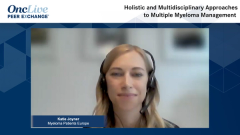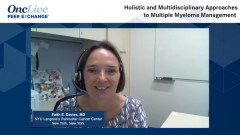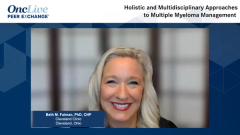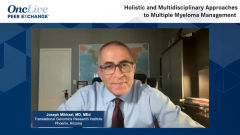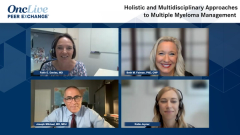
Treatment for Newly Diagnosed Multiple Myeloma: Addressing Disparities in Care
Comprehensive insight to disparities that may impact a patient’s access to therapy for multiple myeloma and how these may be overcome.
Episodes in this series

Transcript:
Faith E. Davies, MD: Katie, obviously, in each country, there are various… barriers and discussions around the best treatments at each stage. I don't know. Do you want to expand a little bit on…the different things that we need to think about as we’re moving into this area?
Katie Joyner: Sure. So...broadly, we know that the pathway is increasingly crowded, especially in the heavily pretreated setting, which is great in terms of options, but…like Beth and Joe said, we don't have the data. We really need to understand what the value is of a lot of these new treatments coming down the pipeline because a lot of them are…single-arm phase 1 studies and we don't really understand how they're impacting patients’ lives. We're not seeing the data in earlier lines. So, we need to understand…the phasing of the pathway and start to look at…a line between the patient and the clinical community, how we can bring treatments earlier to improve more patients’ lives.
From an access perspective…you see everything in Europe. We have countries like Bosnia and Macedonia with extremely limited access, where they're struggling to get generic medicines, and then places like Germany where you can access CAR-T. So, the options for patients and for their treating hematologist to have those kinds of shared decision-making conversations like Beth mentioned isn't always an option. In theory, it's great to say, “What are your values? What do you want right now? What fits into your life and how can we meet those needs with treatments?” But if there's only 1 treatment option, that conversation doesn't make a lot of sense. And it's unfortunate for those patients who don't have a choice there. So…at MPE [Myeloma Patients Europe], we focus a lot on trying to improve that access for patients so that they have different options at different points in the pathway while recognizing that there's a broader challenge within myeloma of a lot of treatments coming, but not necessarily available and when a hematologist might want to use them.
Faith E. Davies, MD: As you say...we can probably split it into…3 broad areas, if that's the right expression. There's that…physical kind of [area], be it the patient's fitness or indeed where they live and what their health care system looks like. There's then the financial toxicity. Again, that depends a little bit on where you live and whether you pay for your medicines or indeed, how much…time off work you need to take. And then, I guess as well, there are some of the social determinants of health. And I know, Joe, you're very passionate about this. I don't know if you’d like to tell us a little bit more about some of the barriers that we can see there.
Joseph Mikhael, MD, MEd: Oh, for sure…and I appreciate you raising that, Faith, because it really is a huge problem. When we look at…the…tragedy in the US of such a health disparity, for example, within the African American community, where the mortality of a Black man or a Black woman with myeloma is twice that of a White man or a White woman with myeloma. Their survival is half that of what you would expect in a White patient. And a lot of that is driven by a previous conversation, that delayed diagnosis. But the second half of that is access to therapies. And sadly, we've seen it in every context, often called the big 4 Ts—triplets, transplants, clinical trials, and CAR-T—we've found a reduced access. And that's complicated. Right? And I'm not going to give you a long speech on all of them, but there are many of what I call nonmyeloma drivers, the basic drivers, unfortunately, of systemic racism of the health care system, the social determinants of health that you've mentioned, where people just don't have access to health care in general and let alone access to a myeloma expert. A lot of this is reflected in geographic diversity, where certain populations are more likely to live in rural areas.
But then there's also the myeloma-specific ones, which we've been discussing. The…delayed diagnosis and reduced access. And so...as providers, it's just important for us to understand the complexity of that, to be sensitive to the fact that this is a greater societal issue, but that it's also [an] in-the-clinic issue. Right? So, when we look at the myeloma-specific [drivers]…people can talk about the health care system and insurance and so on, that's critical. But also, in my clinic…we have patients [who] have less trust in the system. We have patients [who] may view things differently. And…we build that trust, often what we call culturally sensitive care or cultural humility, where instead of saying to myself, “Oh, this person is of this background, they're not going to want to do a clinical trial,” or “They're going to think this way.” Don't assume that you know the way your patient thinks. Take time to listen.
I know…as Faith and Beth and I sit in these busy, busy clinics, it's hard to think that we want to take more time. But I always say time listening is time saved because that connection to the patient becomes really important. And, so, there's a whole series of things that we need to be more sensitive to. And some of them are very pragmatic, as you mentioned, Faith, in social determinants of health, of trying to find ways to ensure that our patients have transportation to their visits and to the care that they need to receive [and] that their family is cared for. Often patients don't want treatment, not for themselves per se, but because if they're unwell or if they're not available, their family doesn't eat dinner. And so those kinds of things...are now starting to pervade the oncology community more. And I'm happy to see that because as I often say, “We don't treat myeloma, we treat people,” right? And so, putting them in that greater context...becomes really important.
Faith E. Davies, MD: That's great…It kind of comes back to something Katie said earlier, that we think about translating our educational material into different languages, but we often don't think about the different communities within that language that we serve. And so...it's really important.
Transcript is AI-generated and edited for clarity and readability.


